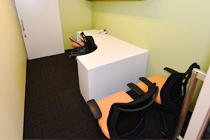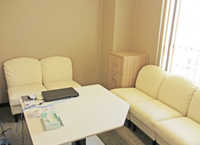From consultation to treatment: a step-by-step guide

To Our International Patients
At Kyono ART Clinic Takanawa, from December 1, 2017, in order to provide the better quality care, the additional consultation fee for all care for foreign nationals who are not covered by Japanese National Health Insurance is charged as shown below.
First consultation fee: ¥ 20,000 + tax
Consultation fee for each visit: ¥ 2,000 + tax
This applies to those who have already been receiving treatments in our clinic.
We greatly appreciate your understanding and cooperation.
First Visit
1. Documents to be submitted
Interview sheet, IVF summary (*), health insurance card, basal body temperature graph, etc.
- (*)
- For patients who have received IVF treatment at other clinics only. Please bring a copy of your basal body temperature graph.
2. Interview

Although some questions may be already answered in the interview sheet, the doctor will ask you the following questions for confirmation.
- Menstruation within the past three months
- Duration of infertility (since the patient started trying to conceive)
- Date of marriage
- Factors of infertility (if already diagnosed in another clinic)
- Any past treatment history
- If the patient has previously received treatment ... types of previous examinations and their results
- Patients who received timing treatment or artificial insemination... Number of times of treatment and their results
- Patients who received IVF treatment ... Number of times of treatment, ovulation induction methods, number of eggs collected, condition of the fertilized eggs, number of embryos transferred, and results
- Please feel free to tell the attending doctor at our clinic any types of treatment you prefer as well as any concerns you may have
- We ask male patients to receive a urology examination
After discussing your symptoms in detail based on your submitted documents, we will explain treatment procedures and the contents of the examination. For patients who have received treatment at other clinics, an explanation on treatment is provided based on the patient referral document and examination results.
3. Pelvic Examination, etc.
| Female patients |
Your first visit can be scheduled at any time. Examinations which are possible at that time will be selected and performed. Since some examinations must be performed during a menstrual period, a first visit during menstruation is also acceptable. When you visit the clinic, the examinations and treatments available at the time of your visit will be selected and performed. The attending doctor will provide an examination plan according to each period. Although the contents of an examination may differ depending on the conditions of the patient on the day of examination, transvaginal sonography is performed for all female patients in principle. The attending doctor will determine on the day whether a blood test is necessary or not. |
|---|---|
| Male patients |
Patients who wish to undergo a semen test should visit the clinic after an abstinence period of 3 to 4 days. |
4. Treatment Policy-Making
Results of a pelvic examination or a semen test will be discussed, and an evidence-based explanation on the treatment policy which best suits the individual patient is provided. The date of the next visit will be determined by protocol.
The return date will vary by patient due to differences in the contents of examination and treatment.
5. Accounting
Fees will vary depending on the contents of pelvic or other examinations. Payment is accepted in cash, or credit/debit card (some restrictions). Acceptable credit cards: NICOS, UFJ, DC Card, VISA, Master, AMEX, JCB, Diners
The procedure seen above will be followed.
All staff members will welcome you with smiles. Please feel free to approach us.

Psychological counseling
Hours for psychological counseling are set separately from general consultation hours. Counseling will be provided, not by a doctor, but by a certified counselor specializing in reproductive psychology. Please feel free to contact us.
One counseling session is approx. 50 minutes per person. Each session costs 3,240 yen for patients already receiving treatment at this clinic, and 5,400 yen for other patients. Reservations can be made at the reception desk or by telephone (03-6408-4124).
Examination
In the treatment of infertility and to achieve pregnancy, it is very important to identify the actual cause of infertility. Before starting treatment, the cause of infertility is identified through examinations. Perseverance and patience are needed, since it normally takes 6 months to 2 years before successful results are achieved. Needless to say, the efforts of the couple are vital. However, we also seek the understanding and cooperation of other family members.
Basal body temperature
Measurement of basal body temperature is a key to infertility treatment. Please measure your temperature every day without fail. This is essential when scheduling an examination date. Please be sure to take your basal body temperature and bring the results to the clinic. The doctor will check the results. Please bring a hard copy of your basal body temperature graph, not electronic data on a smart phone or other media.
Examination Items and Purpose
| No | Examination Items | Period |
|---|---|---|
| 1 | Hormone test | 1-1...2 to 4 days after onset of menstruation (FSH, LH, E2) 1-2...Just before ovulation (E2, LH) 1-3...5 to 7 days after ovulation (E2, P) |
| 2 | Hysterosalpingography | After menstruation and before ovulation |
| 3 | Cervical mucus test | Just before ovulation |
| 4 | Huhner test | Just before ovulation |
| 5 | Antisperm antibody | Any time |
| 6 | Ultrasound examination | Any time |
| 7 | Semen examination | After an abstinence period of 3 to 4 days |
| 8 | Hysteroscopy | During a non-menstrual period |
| 9 | Chromosomal test | Monday to Thursday |
1. Hormone test
The process of menstruation and ovulation in the female body is controlled by hormones released from the hypothalamus, pituitary glands and the ovary. A blood sample is taken, timed with the menstrual cycle.
| 2 to 4 days after the onset of menstruation(basal level) | LH− | Luteinizing Hormone |
|---|---|---|
| FSH− | Follicle Stimulating Hormone (stimulating hormone for egg maturation in the ovary) |
|
| PRL− | Prolactin or milk-producing hormone. High levels of this hormone may affect ovulation and implantation. | |
| E2− | Estrogen (female hormone) | |
| Just before ovulation | LH− | On the day of ovulation, a high value can be obtained, indicating the ovulation period. |
| E2− | Follicular maturation can be measured by the level of this hormone. | |
| 5 to 7 days after ovulation | E2− | This hormone stimulates the thickening of the endometrium. |
| P− | Progesterone hormone Causes the thickening of the endometrium in preparation of implantation. |
2. Hysterosalpingography
Examination period: After menstruation and before ovulation
Hysterosalpingography (HSG) is an X-ray test to examine the size and shape of the uterus and determine whether the fallopian tubes are blocked. During the test, the uterus is filled with a contrast material. An automatic injection machine is used at our clinic, and normally there is hardly any pain (varies with the individual).
3. Cervical mucus test
Examination period: Just before ovulation
Before ovulation, mucus is released from the endocervical canal, in response to E2. In this test, volume and consistency of the collected mucus are examined, in order to confirm the occurrence of ovulation.
4. Huhner test
Examination period: Just before ovulation
This is a post-coital examination of the wife's cervical mucus to determine the presence of the motile sperm of the husband in the area. This can also be considered as a compatibility test, to determine if there are any immunity abnormalities, low sperm count or low motility.
5. Antisperm antibody
This antibody inhibits sperm motility, preventing fertilization. This antibody is detected by a blood test.
6. Ultrasound examination
When an ultrasound examination is given to female patients, a tomographic ultrasound imaging device is inserted into the vagina to determine abnormalities in the uterus and ovary, confirm the number/size of follicles and the thickness of the endometrium.
Regarding ultrasound examination for male patients, testicular volume, presence of spermatic varicocele, and possibility of the blockage of spermatic route (the pathway traveled by sperm) are examined.
7. Semen examination
Examination period: After an abstinence period of 3 to 4 days
The condition of sperm in the ejaculated semen is examined. Semen samples are collected in a container provided by the clinic, by masturbation after 3 to 4 days of abstinence. Abnormalities in the sperm can be detected by examining the semen volume, sperm concentration, sperm motility rate, malformation rate, white blood cell count, etc.
8. Hysteroscopy
Examination period: During non-menstrual period
In this test, hystero-fiberscopy with a small camera at the tip is inserted into the uterus, to detect any abnormalities in the intrauterine cavity. This method is used to determine the presence of any endometrial polyps or uterine myoma, which may obstruct implantation.
9. Chromosomal test
Normally, men have 46XY chromosomes, and women 46XX. These consist of 22 pairs of autosomal chromosomes and 2 sex chromosomes. However, it has been reported that persons with Klinefelter syndrome, having 47XXY chromosomes, are likely to suffer from azoospermia.
Also, a deletion of the AZF region on the Y chromosome has recently been recognized as a factor in azoospermia. Chromosomal abnormalities may cause miscarriage. However, the rate of miscarriage by chromosomal abnormality is not high, and even if this abnormality is detected, there is no cure at present.
At this clinic, is carried out with a certified counselor specializing in genetics, and a more detailed explanation of the results of the chromosomal test are provided.
Treatment
| Female patients | Preparation - Egg collection | Ovary stimulation Natural period In-Vitro Maturation (IVM) |
|---|---|---|
| Egg collection - Pregnancy test | Egg collection Fresh embryo transfer Pregnancy test |
|
| Other | Recurrent pregnancy loss | |
| Male patients | Oocyte activation PolScope method |
|
Surgery
| Female patients | FT (Falloposcopic Tuboplasty) Endometrial polyp |
|---|---|
| Male patients | Obstructive azoospermia (simple TESE) Non-obstructive azoospermia (Micro TESE) Spermatic Varicocele |
